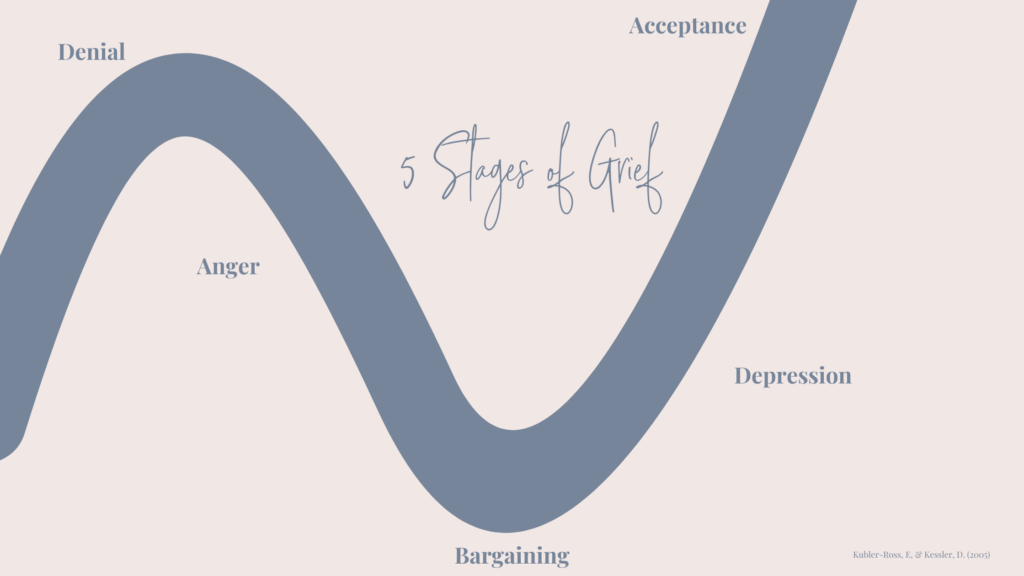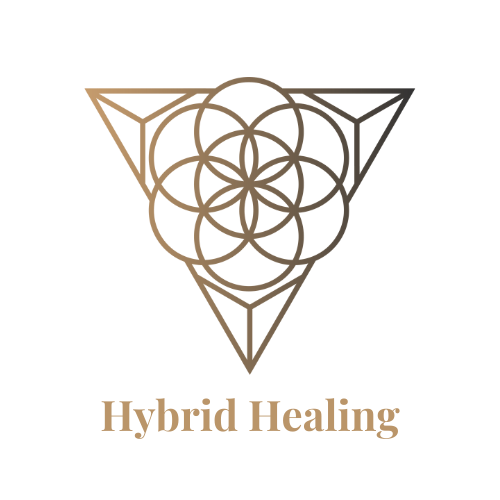
Grief is defined as an emotional response to some form of physical or non-physical loss, whether it be a death of a loved one, loss of employment, finances, material possession, or relationship. There are many theories around the process of grief, including Kubler Ross, Stage theory, 5 stages of grief, which highlight that grief moves through five stages.
The following is a brief outline of the five stages however this is certainly not an exhaustive list and each individual will have their own unique experience, however, these are the commonalities we often see amongst individuals who have or are experiencing grief in their lives.
Stage One, Denial. Denial is a defense mechanism, often we will jump straight into this feeling. We try so hard to either pretend it’s not happening or hasn’t happened by putting on a brave face, the “I’m okay face”, you know, the one where we stuff our feelings right to the bottom and cover it up with a whole lot of other stuff. It could be shopping, eating, drinking, loads of sex, or other things to mask the feelings until it will eventually erupt like a volcano. You may feel numb to it all, like frozen in time, without being present and engaged. Denial will have you telling your friends and family you are fine or continuing to try and replay scenarios to get an alternative more desirable outcome. This is where you might be trying to get back together, pretending a break hasn’t even happened or trying to salvage that career or business, trying to recover something that you know for sure is gone. This can continue for months if not years. Often your value system has been breached and you will allow things to continue, denying over and over again for the sake of avoiding pain, and the list goes on.
What can we do when we are faced with this situation, which, many of us may face at some stage in our lifetime. Firstly, be honest with yourself, if I know one thing for sure, the longer you avoid and deny pain, the harder it is to move on. You just want to rip that band-aid off and face the music. Prolonging what you know in your heart of hearts to be true is just torturing yourself and if you want to find your way back to self-love and happiness why would you even put yourself through that grief in the first place.
Stage Two, Anger. Once you move through the denial then comes the anger and rage, you will feel angry at yourself and angry at others, this too is a defense mechanism built in to fight back, to throw a tantrum at the situation to try and resolve it. Often you might feel vengeful or feel angry at yourself for what you did or what was done to you. You may be holding a grudge harboring unforgiveness in your heart, or desperate to transfer your pain onto others. Anger just disguises deep pain and loss, it manifests as a way to externalize the grief we are feeling inside. It can cripple us and keep us stuck in inaction whilst we search endlessly for ways to “get back revenge” or punish ourselves for what we feel we have done. You will be trapped in this emotion until you can resolve to forgive.
What we can do when we are faced with such anger and rage is to accept that there is nothing we can do to change or resolve what’s happened or happening. To allow yourself space and give yourself the permission to feel your anger and rage, the hate that you feel.
If you are struggling right now and need a little help, here is a great tool that has helped many of our clients move through lifes challenges, you can watch the video and grab the download HERE
Stage Three, Bargaining. This stage will come when you get tired of feeling angry, you will want to try hard to remove the feeling inside of you, so much rage gets tiring after a while and you will start to bargain in any way to remove the feeling. Possibly feeling like a trade or exchange for the removal of the negative feelings to release the pain and feel love and happiness again. You may try to salvage the lost relationship; career, business, or thing, these attempts can become desperate and often outrageous (desperate people go to desperate measures to get their needs met). (See Maslow’s hierarchy of needs). Bargaining to feel safety, security, and comfort for what you once knew, the craving for intimacy, closeness, and fulfillment.
What can we do when faced with this desperation to claw back what we once had, graciously move through the emotions, understanding that even if you were to go back it would never be the same again, that you are not the same person. That whatever happened did so for a reason (which we may never know, or not discover for some time to come) to know that that person left us, that loss (if by choice or by force) and that we must let them or that go, that the decision has been made. If we try through pure desperation to force or beg for something to come back to us, we diminish our self-worth and also drop our standards and values, this can destroy our self-confidence, and self-love even further than what has already taken place from the loss. If you are struggling emotionally, we recommend a daily dose of the “Heal Your Heart Guided Meditation”.
Stage Four, Depression. At this stage we may experience a deep level of sadness, can become anti-social, heavy heart, heartbroken, trapped in thinking about the past, often coupled with anxiety, guilt, shame, and regret. Blaming oneself, wishing things were different, trying to rewrite the past, trying to find a better version. This is often referred to as the dark knight of the soul and can be one of the most painful stages to go through.
What can we do when faced with this stage, is to recognize that we are not alone, that many people are experiencing this and to reach out for support, find a loving ear. Listen to meditations, including the Heal Your Heart Guided Meditation. Read positive books, jump into the Heal Your Heart Facebook Support Group, or book in a Private Session here, watch uplifting movies and find local support groups where you can surround yourself with positive like-minded individuals.
Stage Five, Acceptance. This is often the final stage of the 5 stages of grief, often you will arrive at this stage once you have come to terms with the loss, the grief, the guilt, and shame. You are starting to see a light at the end of the tunnel, starting to feel that there is hope and future thinking. Imagining what is next for you and life planning for the future from now. No longer gripping onto the past but letting go and accepting that life is as it is now and that you will now need to move on and adjust to a new life, a new direction.
Often you will feel a freeing sense, a release of the past and what has held you in its grips for so long. Moving through these stages can be long and painful without guidance so it is important that you find the support you need to help you navigate through these stages and come back home to self-love, self-acceptance, and look forward to an amazing life lived to its fullest potentiality. We have created the “Heal Your Heart Facebook Group” to support women just like you to move through the stages with more grace and understanding. You can also book in a private session with us HERE. I only wish that I had these tools when I was moving through this process myself, I would have understood what was going on and also not had to endure the pain for quite so long and saved a bucket load of money and time.
Are you going through grief? Can you identify what stage of grief you are in?
We are here to help you heal past trauma and move through life’s challenges so you can go on to live a more fulfilling life.
Warm Regards
Loretta Morgan
References
Kubler-Ross, E, & Kessler, D. (2005). On grief and grieving: Finding the meaning of grief through the five stages of loss. Simon and Schuster, 2005.
Parkes, C. M. (2013). Elisabeth Kűbler-Ross, On death and dying: a reappraisal. Mortality, 18(1), 94- 97.
Gregory, C. (2021). Five Stages of Grief. Psycom, Remedy Health Media. https://www.psycom.net/depression.central.grief.html
Wikipedia. (2021) https://en.wikipedia.org/wiki/Grief

Recent Comments